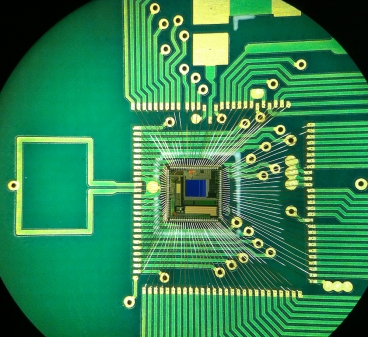MIT Connects to Biological Power Supply in Your Inner Ear
There is an untapped power source in your inner ear.
Researchers at MIT have, for the very first time, successfully accessed a biological power source that has been known to exist for several decades. That source is located in the inner ear's cochlea where it provides sufficient current to power an electrochemical signal that originates in the vibration of the eardrum. That mechanical force is converted to a signal that is sent to and processed by our brain.
The cochlea serves as a natural battery chamber filled with ions. There have been ideas to tap this "battery", but scientists did not have a feasible concept to actually do so previously.
"In the past, people have thought that the space where the high potential is located is inaccessible for implantable devices, because potentially it’s very dangerous if you encroach on it," said Konstantina Stankovic, an otologic surgeon at the Massachusetts Eye and Ear Infirmary (MEEI). "We have known for 60 years that this battery exists and that it’s really important for normal hearing, but nobody has attempted to use this battery to power useful electronics."
In experiments, Stankovic and her colleagues tested electrodes in guinea pigs’ ears and attached low-power electronic devices to those electrodes. The researcher said that "the guinea pigs responded normally to hearing tests, and the devices were able to wirelessly transmit data about the chemical conditions of the ear to an external receiver."
Key to success was the development of extreme low-power circuits, MIT said. the voltage provided by the cochlea is "very low" and, in order not to impact general hearing, only a fraction of that power can be used for circuits.
Future applications of the technology may include cochlear implants, diagnostics and implantable hearing aids.
There was no information when commercial devices could be ready to take advantage of the discovery.
Get Tom's Hardware's best news and in-depth reviews, straight to your inbox.

Wolfgang Gruener is an experienced professional in digital strategy and content, specializing in web strategy, content architecture, user experience, and applying AI in content operations within the insurtech industry. His previous roles include Director, Digital Strategy and Content Experience at American Eagle, Managing Editor at TG Daily, and contributing to publications like Tom's Guide and Tom's Hardware.
-
A Bad Day One question:Reply
If the implants are ever Wi-Fi capable, what would be done to prevent malicious attacks like in the "H+: The Digital Series"? -
merikafyeah I don't think it'll ever be wifi capable. The amount of energy needed to create a signal of useful strength may not be large electronically, but biologically it'd be like setting off a nuke inside your ear.Reply -
fuzg13z merikafyeahI don't think it'll ever be wifi capable. The amount of energy needed to create a signal of useful strength may not be large electronically, but biologically it'd be like setting off a nuke inside your ear.Konstantina Stankovic"the guinea pigs responded normally to hearing tests, and the devices were able to wirelessly transmit data about the chemical conditions of the ear to an external receiver." Maybe it's not too far off after all, you could use an external repeater to boost the signal..Reply
-
esrever wonder how hard is it to make an artificial version of this and how efficient it would be to power things. Seems like a very eco friendly way to replace batteries if its possible.Reply -
A Bad Day esreverwonder how hard is it to make an artificial version of this and how efficient it would be to power things. Seems like a very eco friendly way to replace batteries if its possible.Reply
Yeah, I would rather use a small portable flexible solar panel and/or a piezoelectric shoe to recharge my phone than to have surgery in my ears. Thank you very much.
-
unempit Hmmm. I wonder if this knowledge can allow the repair or replacement of the cochlea's power generating ability to restore hearing. Maybe the "battery" is wearing out as we get older...good thing I'm not a doctor.Reply -
A Bad Day Usually hearing loss not caused by disease, injury or genetic disorder have damages to microscopic hair that pick up the vibration in the cochlea's fluid. Broken sensory hair results in weaker reception of sound, and those kind of hair never grows back.Reply
